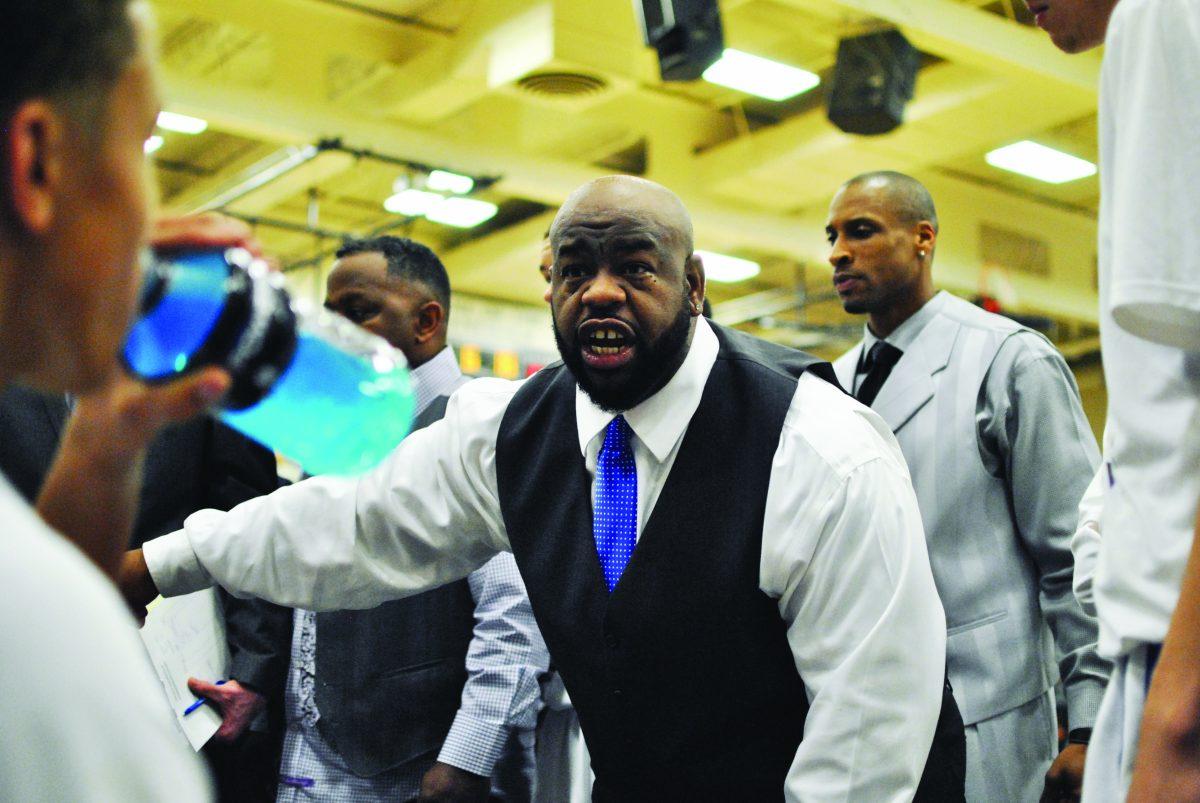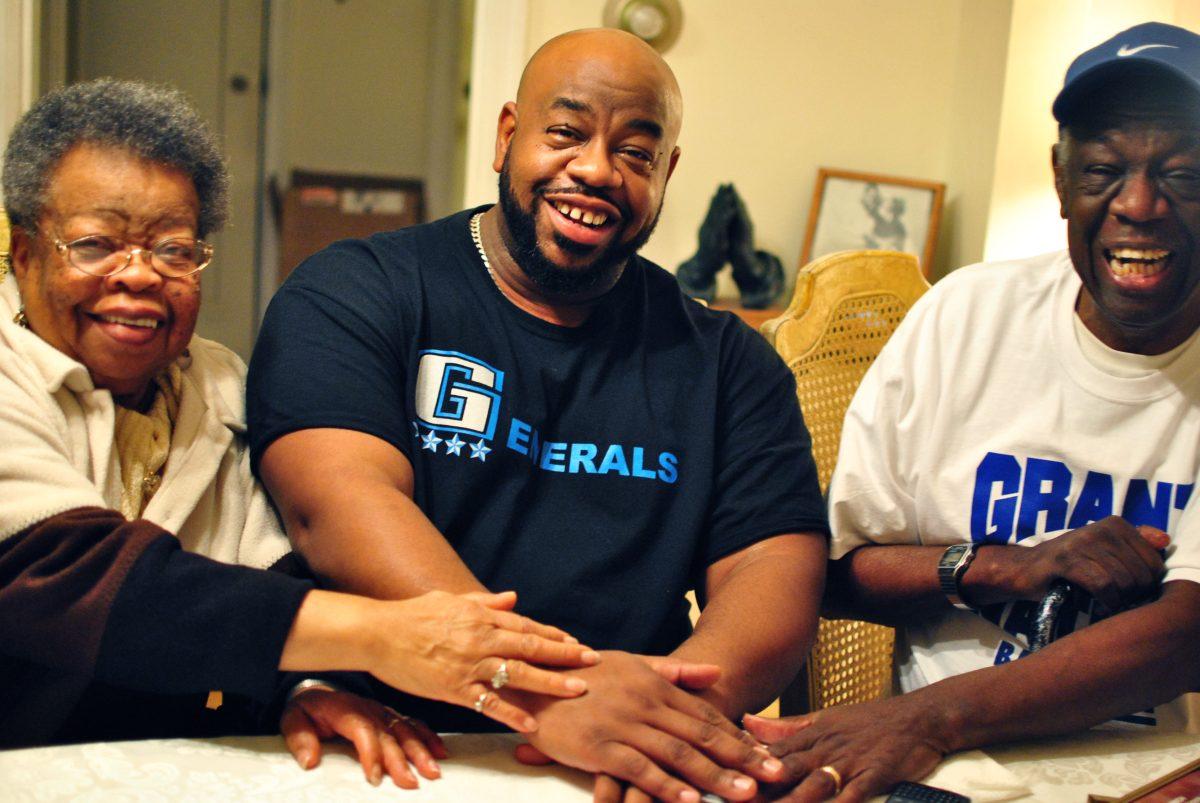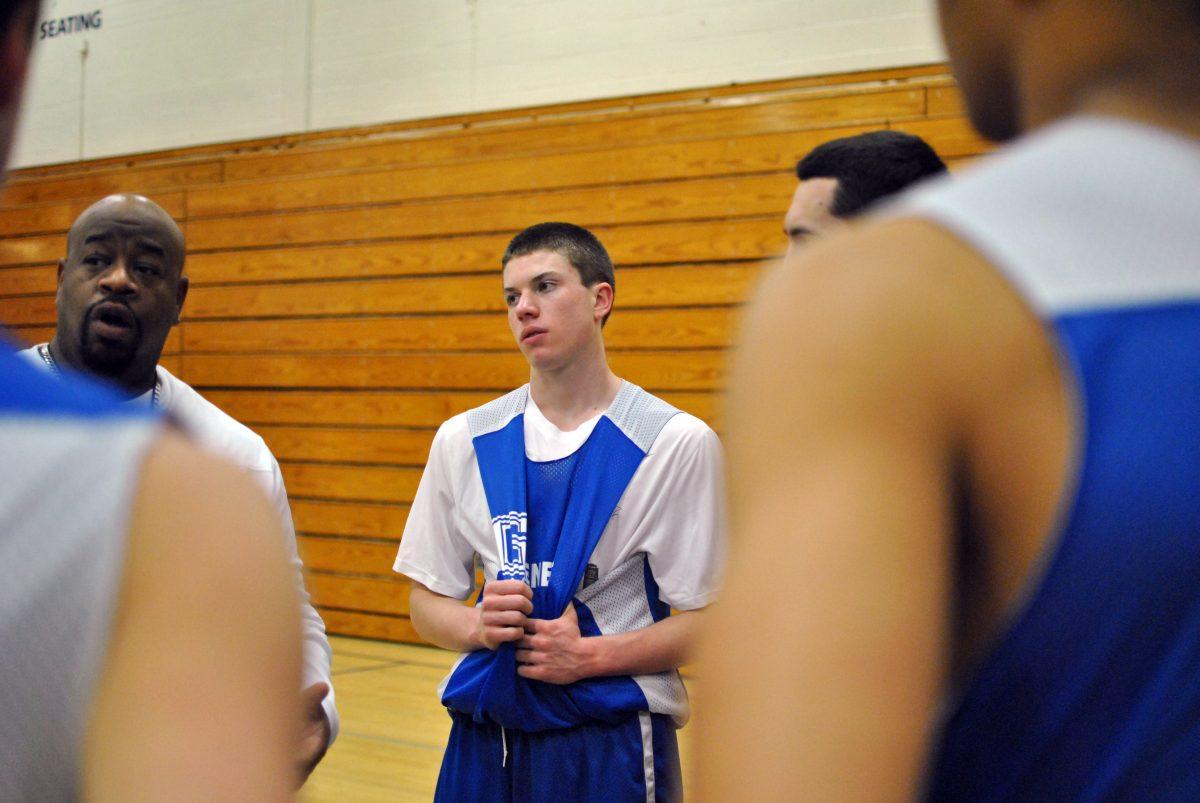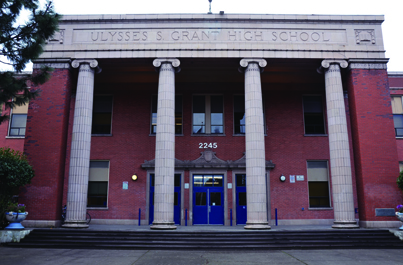The third quarter ends with the Grant High School basketball team leading by two points against top ranked 5A opponent Jefferson High School. Head coach Paul “Duper” Kelly, formally dressed in a tie and vest, resumes his position. Water bottle in one hand, white towel in the other, at every pause in the action he wipes the sweat from his forehead.
With 4:13 left in the game, Kelly takes a timeout to ensure Jefferson doesn’t cut any further into his team’s eight-point lead. Fumbling for a whiteboard in the huddle, Kelly snatches a dry-erase pen from his pocket and maps the Xs and Os directly on the court floor. “This is the type of adversity we have been talking about. Don’t go to sleep, boys,” Kelly says to his players.
Later, Kelly claps his hands in relief as his team’s lead extends to fourteen points: “See, boys? If we are mentally tough, it don’t matter what they throw at us.”
For Kelly, the new coaching position serves as a hopeful return. A Grant High School graduate of 1989, Kelly replaced 10-year varsity coach Tony Broadous in the wake of last year’s hazing scandal.
Kelly, 40, has landed his dream job. He says he has something to prove to the Grant community – something that dates back to his time as a high school player and as a longtime coach for a number of programs throughout the city. “Even when I wasn’t here I was always a General,” Kelly says, “I want to have success wherever I am but it is icing on the cake that I can do it at Grant.”
Principal Vivian Orlen says Kelly was an easy choice. She wanted to rebrand the basketball image and needed a coach who understood the high expectations of the community.
“Kelly’s passion to return to Grant High School was obvious to me,” Orlen says. “He was a great example of someone who was willing to learn (and) accept feedback, and had an enormous potential to grow.”
Born and raised in Northeast Portland, Kelly has been playing basketball ever since he could walk. Every year beginning at age four, Kelly would receive a brand new red, white and blue “Dr. J” basketball, along with a Nerf hoop for Christmas.
Kelly’s sister, Fara, remembers when he was a little kid: “He was pigeon toed and always had a basketball in his hand.”
Kelly recalls that his house was “the neighborhood community center,” with family, friends and neighbors regularly gathering to play inside and out. He remembers dunking with his brother and friends on the basketball hoop attached to a tree in the backyard.
As the smallest and youngest kid in the group, Kelly learned how to lose. His brother, Byron, who is three and a half years older, showed no mercy. “He didn’t let anyone else beat up on me, he just did it himself,” Kelly says. “Whether it was basketball or video games, I was the punching bag.”
Kelly’s family also remembers him as an exceptional student. Dad, Willie John Kelly, says “school was always a priority” in his house and he wanted his kids to excel but Kelly needed much less help than his other kids.
Kelly used academics as yet another way to get noticed. “I took a lot of pride in my grades; it was a competition,” Kelly says. “I remember getting a B+ and crying.”
Participating in the prominent athletic program housed in the Matt Dishman Community Center, Kelly considered himself one of the best players in his age group entering high school. He came into Grant as the school was coming off a state championship in 1986. “It was competitive, only the best of the best were going to get a chance to shine and I thought I was one of those guys,” he recalls.
Kelly averaged close to 25 points a game in his first season on the Grant freshman team and in his second season he was placed on JV, despite his hopes to make the varsity squad. “I didn’t have much of an argument that I should have played,” Kelly says, because “my sophomore year we won the state championship again in ‘88.”
During his junior year season, Kelly became frustrated over his playing time. He called his coach to ask what he could do to earn more time on the court. The coach told him to “wait his turn.”
As his senior season approached in summer 1990, it hit Kelly him that this year was his one and only shot. He remembers the only way of getting a college basketball scholarship was “going to the state tournament, playing well and getting noticed.”
There were several team members whom Kelly had played with since elementary school. “I had a really great summer,” Kelly remembers, it was a “preview of what the season would look like.”
Kelly was shocked and upset when he again found himself on the bench at the start of the season. Kelly felt like he was running out of time. “I had sacrificed so much for that one year,” he recalls.
Though Kelly wasn’t playing as much as he wanted, the team was successful early in the season. His team defeated Benson, which was ranked first in state at the time, and Grant was set to play them a second time on the road. Kelly’s brother was back from college and the rest of the family was at the game to cheer him on.
As the game grew closer to the end, Kelly remained on the bench. With five minutes left, a player fouled out. Kelly prepared to enter the game. “I remember thinking to myself: If he doesn’t play me now, it’s personal, it’s not something I have control over.”
The coach stood up, walked down the bench, looked Kelly in the eye and put a younger player in the game.
“It crushed me,” Kelly remembers. “I (saw) my basketball career go down the drain.” Kelly immediately took his uniform off and walked off the court.
Kelly’s father, Willie John Kelly, now 76, supported his son’s decision to walk away from the team. “I was always under the mindset that whatever my kids wanted to do, it would be their choice; I wouldn’t choose for them.”
Kelly’s basketball season was devastating, but it triggered an key transition in his life. “It propelled me into coaching,” he says. “I never wanted kids to go through what I went through.”
When Kelly became a coach, he wanted to make sure he moved away from the style that frustrated him as a player. “Coach didn’t communicate with me. I didn’t feel like he wanted me to play. As a 17 year old, it was tough to take,” he says now.
In 1999, Kelly coached the Grant freshman team to remarkable success. Kelly’s peers at Grant featured him as a keynote speaker at the athletic banquet, but his job remained up in the air. Meanwhile, Jefferson High School was coming off a state championship and ranked fourth in the country, and they asked Kelly if he wanted to be a part of their coaching staff.
“It was a no brainer for me,” Kelly explains about taking the Jefferson position. He admits he always wanted to beat Jeff but he had to keep his eyes on his future as a coach.
Under prominent Jefferson coach Marshall Haskins, Kelly says he was exposed to the best. Once Haskins stepped down, the head coach position was between Kelly and another assistant, Pat Strickland. “It was very competitive between me and Strickland, and he picked Strickland,” Kelly says. “Everything happens for a reason. When something happens to me I use it as energy to prove people wrong.”
From there, Kelly had some time away from high school sports but still “tried to stay relevant as a coach.” During this time, Kelly was able to focus on his nonprofit called “Tha Family Inc.” He created the athletic mentoring program out of the relationships he developed with young basketball players throughout Portland.
“Tha Family is about developing kids for the next level and using athletics as a tool to obtain a college education,” Kelly explains.
Kelly started the program with 15 12-year-olds whom he mentored all the way through college. He provided them the opportunity to travel and connect with college athletic programs.
Now in their mid 20s, they have all gone to college on scholarship.
Since the original group of basketball players, Kelly has worked for eight years mentoring young men. Kelly is proud to say his time, money and dedication have resulted in scholarships that allowed young men to pursue higher education.
During this post-assistant-coaching period, Kelly also started an alternative league in honor of his godson, Walter Dines Jr., who died in a tragic drowning accident.
Kelly’s best friend, Walter Dines Sr., was one of his old teammates from high school. His son died at age 18 in June 2010 on the Clackamas River. “I helped him take his first steps as a kid,” Kelly says of Walter Dines Jr. When Dines Jr. was 7 or 8 years old, he moved away to Maryland, but he always returned for the summer.
A straight A student and an enthusiastic young man, Dines Jr. reminded Kelly of himself. Dines Jr. earned a full ride scholarship to New Haven Connecticut, but never got a chance to go. “I wanted to do something to honor his spirit, so that’s how the basketball league started,” Kelly says. The league gives students from alternative schools an opportunity to play at the high school level.

As a community works leader for the Department of Community Justice in Multnomah County, Kelly supervises work crews throughout the neighborhood. Some of the men and women are on probation, others working off fines and tickets from their record through service. Kelly works 40 hours a week, overseeing crews doing chores from raking leaves and planting food in the garden to working at Loaves and Fishes or in the Oregon Food Bank.
“I am just trying to help people better themselves and create better opportunities for their own life,” Kelly says.
Kelly returned to coaching high school in 2011, leading De La Salle to the second round of the OSAA 3A state playoffs. After one season there, Kelly spotted the opening for the head coaching position at Grant. He and five other hopeful coaches submitted their applications to the Grant athletic committee, comprised of vice principals Curtis Wilson and Brian Chatard, Principal Vivian Orlen and Athletic Director Diallo Lewis. They reviewed the applications and called them each in for round one of interviews.
Orlen says they were looking for someone who would be willing to invest in youth basketball, had the technical expertise to coach at the high school level, and was able to connect with Grant athletes.
In the aftermath of the hazing incident last winter, Orlen has worked to rebrand athletic programs. “Basketball is one arena that I made some changes in, but not the only one,” Orlen says.
Orlen says Kelly “was a great example of someone who was willing to learn and accept feedback.” She was impressed by “his desire to help reach all of the kids he coached,” she says.
Kelly earned the position and immediately set his eyes on the season. “Ever since I got the job, I have done something related to basketball,” he says.
Current varsity assistant Marv Patton has known Kelly since high school. Patton remembers growing closer to Kelly when he was the JV coach at Grant and Kelly was leading the freshman team in a nearly undefeated season. “He is motivated,” Patton says. “He has always wanted the best for his players.”
Fara Kelly is excited to have her brother back at Grant. “I was glad to see all his hard work and sacrifices pay off. Now he’s back on center stage,” she says.
Midway through the season, Kelly is now settled in. “My goal for the season is a state championship,” Kelly says. “That’s what I came here for, nothing less.”


































